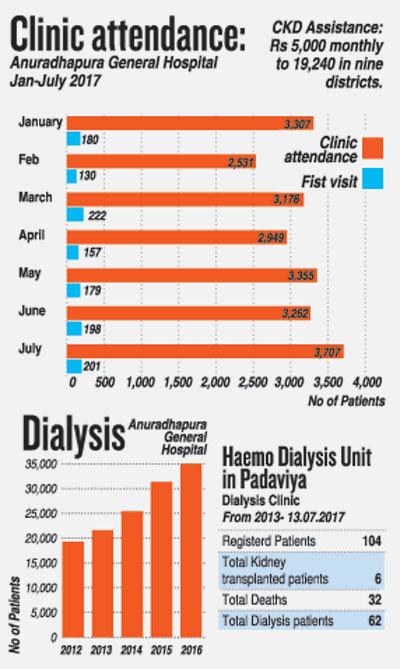News
Chronic Kidney Disease grips NCP as Dialysis prolongs the inevitable
Four hours a day, three days a week, 60-year-old D. Gunatillake spends his time hooked onto a Dialysis machine at the Padaviya Base Hospital (PBH). It’s been his weekly routine for the past six months, since he was detected with Chronic Kidney Disease (CKD). Gunatillake and seven others fill the Haemodialysis Unit of the PBH to capacity each day except Sundays, to clean the machines. For Gunatillake and hundreds of others across the North Central Province (NPC) suffering from CKD, these machines are their only lifeline, with a kidney transplant as the only alternative.
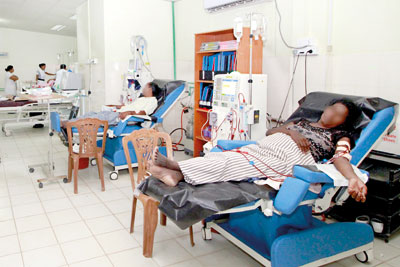
Patients at the Haemodialysis Unit of the PBH. Pix by Indika Handuwala
“I no longer have any strength in my body, but I still take a bus from my village which is about 8 km away, to get here three days a week. Sometimes when I get too tired, I only visit two days a week,” Gunatillake said.
He was once a healthy farmer working more than three acres of paddy land. It was about 10 years ago, when two of his brothers and a sister were detected with CKD, and all died within a few years. He was first diagnosed with the disease two years ago, and was initially treated with medicine until his condition got acute, following which he was referred for Dialysis.
“I can no longer work in the fields due to poor health, so my wife and I now live on Govt assistance given to CKD patients,” said Gunatillake, as he waited his turn on the Dialysis machine.
His story, tragically, is also the story of hundreds of villagers in the NCP, and more so in Padviya and surrounding villages where the prevalence of CKD among the population has reached alarming proportions. Many of them also fall into the category of those suffering from CKD of unknown aiteology (CKDu), a condition, the cause of which still remains speculative, with medical personnel and researchers going to and fro guessing the cause of the high prevalence, particularly among the farming community in the NPC. While exposure to agrochemicals, drinking hard water with elevated fluoride levels and dehydration caused by long hours exposed to extremely hot temperatures, are cited as some of the causes, doctors at PBH are seeing that many of those suffering from CKD in the area, also suffer from hypertension, diabetes and other underlying causes which make them susceptible to CKD.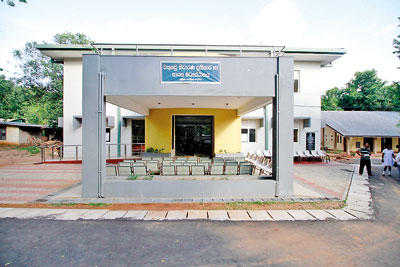
“Most of the patients being farmers have been exposed to agrochemicals for years, but we are now seeing that many of those suffering from CKD also suffer from other medical conditions which affects their kidneys. There is also high consumption of alcohol and tobacco in these areas, while dehydration is also common due to inadequate consumption of water,” said Padaviya District Medical Officer Dr Pubudu Ranaweera.
The PBH medical staff is far short of the required numbers, with doctors, nurses and other staff stretched to the limit, having to cater to the large number of patients who attend the Renal Care Unit. Since the Dialysis Unit was set up four years ago and the hospital upgraded, patients from Welioya, Kebethigollewa, Siripuara and Wahalkada also benefit from its added facilities. The Dialysis machines work three shifts a day and the 62 patients on its register at present, would have no chance of survival without regular Dialysis.
“Earlier, all the patients had to travel for one-and-a-half to two hours to get to Anuradhapura General Hospital, the only one which treated patients with CKD. Now most come to PBH for treatment, which is a boon to these people,” Dr Ranaweera said.
Acting Consultant Physician Dr Missaka Senanayaka has seen firsthand, the hardship CKD patients undergo.
“They all come from low income families who get by on daily wages. For them, learning they suffer from even early stage CKD is like receiving a death sentence. There is an inherent fear among them, as they have seen many of their fellow villagers suffer and die,” Dr Senanayake said.
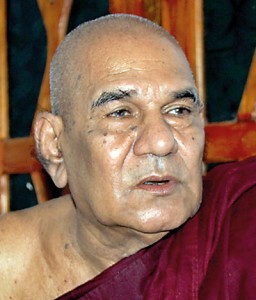
Ven. Gnanawimala Thera
Despite the available facilities, many who are referred for Dialysis are reluctant to undertake the treatment and instead, rely on medication. “What these patients need now is counselling, as many of those detected with CKD or, even those in the earlier stages of the disease, tend to get depressed. There have been several instances of attempted suicide,” he said.
Medical Officer-in-Charge of the Renal Care Unit, Dr Fazly Farook echoed similar sentiments. “Recently, an elderly man came to the PBH with his son. I looked at his reports and told him he was suffering from kidney diseases. Initially, he would not accept it. It took a while for it to sink in and then, both the father and son broke down and cried,” he said.
V.A. Sugathadasa (63) is one such person who feels helpless. His wife Somawathie is seriously ill and undergoing Dialysis, while he is in the early stages of the disease and on medication. “For years I made a living by spraying pesticides and weedicides. I was paid Rs 1,000 per day for my work. I think the agrochemicals harmed us,” he said.
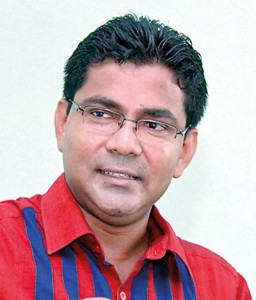
Dr.Missaka Senanayake
Lacking the strength to work anymore, Sugathdasa and his wife get by on the Rs 5,000 Govt. handout to CKD victims. (See BOX story) “My wife and I will not live much longer. We have no children so we are not a burden to anyone,” he said.
B. Ukkumanika (58) a resident of Siri Pura in Padaviya, was diagnosed with CKD eight years ago. While on medication, Ukkumanika says she feels the disease slowly creeping upon her, making her body weak by the day. “There are days I cannot even get up and lie in bed the whole day. I can see my end is coming,” she said.
Her husband S. Chandrasekera (70) who was a vegetable farmer, is convinced that the exposure to agrochemicals made his wife and hundreds of other farmers seriously ill.
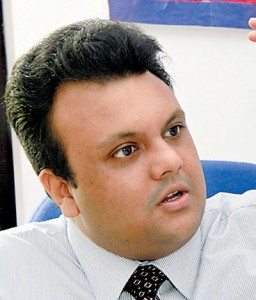
Dr. Madhava Dharmadasa
“I used agrochemicals for years, to get a high yield from my crops. While spraying it, I could feel these were poisonous, but I still continued to do it, as I made a living by selling vegetables. It was against my conscience, but once we started using the chemical fertilizer, it was difficult to stop,” he said in a confessional tone.
At the Sudharshanaramaya in Siri Pura, people gather every evening for the Bodhi Pooja, to invoke the blessings of the triple gem, and the topic of discussion often is the plight of those suffering from CKD. A 58-year-old incumbent monk at the Temple lies seriously ill, as the Dialysis has done little to improve his condition.
For Ven. Gnanawimala Thera, the chief incumbent at the Temple, visiting homes where people have died of CKD, is nothing special. “I have lived here since 1969, but cannot recall people falling ill in this manner in the ’70s and ’80s. Being a border village, during the 1990s we were more concerned about the war, having to face regular attacks from the terrorists. So we may not have noticed people falling ill, but now, in almost every home there is at least one CKD victim,” he said.
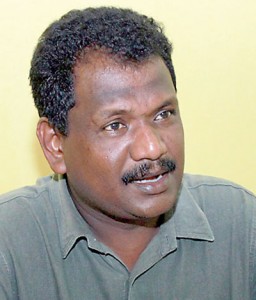
S.Wasantha
The sense of hopelessness among the villagers is also pushing them towards alternate medicine, with several hundred queuing up to consult an Ayurveda doctor who visits the village once in two weeks. “People are desperate, so they will try anything, as long as they can get some relief,” the Thera said.
But Health authorities in the area, opt for more scientific methods for early detection of CKD, to improve the chances of survival and quality of life.
Padaviya Medical Officer of Health Dr Madhava Dharmadasa is the person tasked with screening of all adults over 20 years. “Of a population of a little over 25,000 in Padaviya, we have screened close to 70%. To make the programme more effective, we also conduct mobile clinics to collect blood and urine samples. This programme has helped detect around 900 new patients, many of them in the early stages, which would significantly improve their prognosis,” Dr Dharmadasa said.
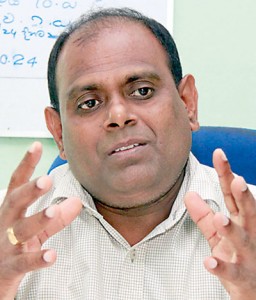
Dr.Pubudu Ranaweera (D.M.O)Padaviya
The screening programme also covers Non Communicable Diseases, the increase of which is seen as a major contributory factor towards CKDs.
While medical opinion is divided on what causes CKD, most patients are convinced that large scale use of agrochemicals, over the past four decades, has slowly poisoned the earth, thus polluting the water they drink, leading to this situation.
Irrigation and Water Management Ministry Resident Project Manager N. Wasantha is among those who are committed to weaning the farmers from their over dependence on chemical fertilizer, as well as other agrochemicals.
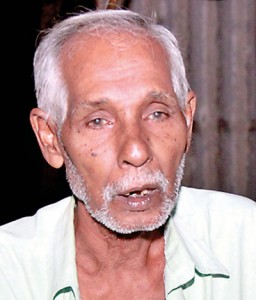
S.Chandrasekara
“It is an uphill task, because farmers want a high yield, be it from paddy farming or from vegetables, and use of agrochemicals helps achieve their targets. But now, we see the harm this has done to the farming community,” he said.
Wasantha, along with leaders of several farming societies in the area, have begun to propagate the use of local varieties of seeds more resistant to weeds and pests, and hence, grown with minimal use of agrochemicals.
“The excessive use of agrochemicals is not only poisoning the farmers, but also the others who consume their produce, which is why there must be more State intervention to encourage traditional farming methods, and to boost local varieties of paddy, vegetables and fruits,” he said.

B.Ukkumanika
However, while the Govt machinery is trying its utmost to mitigate a situation which already seems out of control, for Gunatillake, who makes the thrice-weekly hospital visit for Dialysis, there is little hope for the future.
“I will have to spend the time I have left visiting this hospital for Dialysis. I cannot think of ever getting a kidney transplant, because I do not have sufficient money, and hence, will not find a donor. This is my karma,” he said.
For Ven. Gnanawimala Thera, the issue is one that goes beyond the fate of individuals. “We have overcome one war, but this is the bigger war that we have to fight now,” he said.
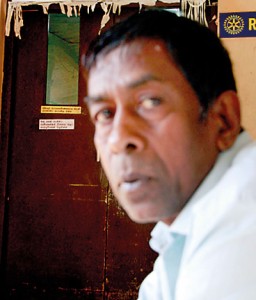
D.Gunathilaka
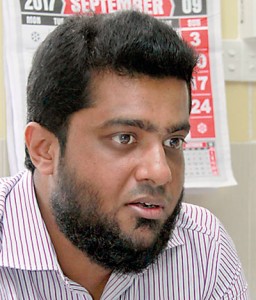
Dr.Fazly Farook
| Govt. financial aid mitigates circumstances somewhat | |
| Since June this year, the Ministry of Social Empowerment and Welfare has begun a monthly payment of Rs 5,000 as CKD assistance to those from low income groups. At present, there are 19,240 persons in nine Districts eligible for the grant.The allowance is granted on the recommendation of a consultant confirming the person is suffering from CKD and is taking regular treatment for the condition.”In Padaviya, more than 2,200 people have signed up for such assistance,” said Divisional Secretary G.M.K.R. Priyadharshana. Several other measures too have been taken to assist the needy people there. The National Housing Development Authority grants financial assistance to build houses for families with CKD patients. Those eligible will receive Rs 500,000 to build a new house, while Rs 150,000-200,000 will be given to renovate houses,” Mr Priyadharshana said. “Steps have also been taken to install Reverse Osmosis water filters in almost all the villages, so that, people have access to clean drinking water,” he added. 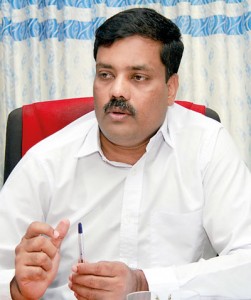 Divisional Secretary G.M.K.R. Priyadharshana |
